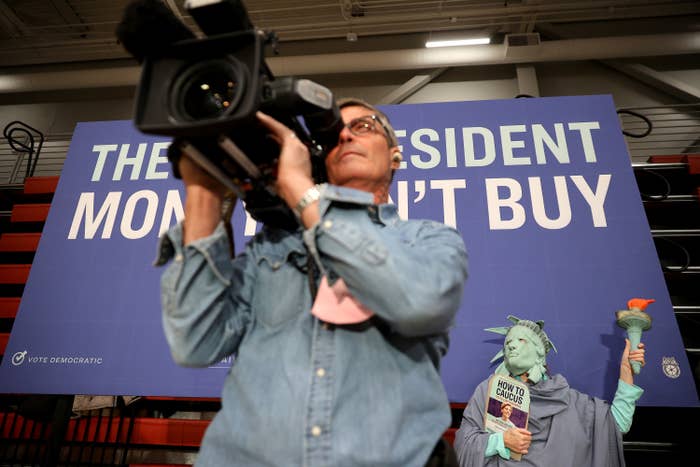
DES MOINES — The Des Moines Register spiked its poll Saturday night, but by the next day it seemed most reporters here had seen the numbers — or something purporting to be the numbers.
Here’s what happened: As the Des Moines Register readied a cover story and CNN prepped for an hourlong special about the time-honored poll, Pete Buttigieg’s campaign complained that his name hadn’t been offered to some poll recipients. The pollster, Ann Selzer, quickly discovered the glitch in a Florida call center that triggered the error. It seemed likely to be just a minor error — but everyone involved cares about their reputation for trustworthiness, and they quickly decided to pull the poll rather than publish with doubts.
But the news organizations had already been preparing to publish the numbers, and a version of them began to circulate almost instantly. I won’t print those numbers: I haven't been able to confirm that the numbers I’ve seen are the already-questionable official ones.
And yet, most veterans of coverage here trust Selzer’s surveys. So many acknowledged to me last night that they’d quietly taken the unreleased and possibly wrong numbers into account.
“Nobody was talking about Elizabeth Warren and now everybody thinks she has a shot because of those numbers,” said Rebecca Katz, a progressive political consultant who supports Warren. (It’s not the only reason, I should note: Other polls this week also showed Warren in a strong position, as did the last published Selzer poll in January.)
I won’t point to specific coverage here, because reporters were kind enough to speak to me off the record about their thinking and decisions. And I should note that some reporters hadn’t seen the poll, or genuinely don’t incorporate polling into their reporting, or didn’t think the numbers they saw changed the way they were already seeing the race. Indeed, the numbers widely circulating aren’t that different from last month’s edition of the same poll, or some other recent polls. But to other people, both journalists and operatives, milling around the lobby of the Des Moines Marriott Sunday night, the impact had been obvious.
Here are what some reporters told me about how the poll affected their work:
• One reporter for a major newspaper told me they inserted a few paragraphs into a story to anticipate results predicted by the poll.
• A reporter for another major national outlet said they covered an Elizabeth Warren event in part because she looked strong in the secret poll.
• Another outlet had been trying to figure out whether Amy Klobuchar was surging; the poll, which looked similar to other recent polling, steered coverage away from that conclusion.
• “You can’t help it affecting how you’re thinking,” said another reporter.
The numbers bled into the opinion-making Twitter conversation. Right-wing figure Mike Cernovich tweeted a version that matched what some journalists had seen. Yang supporters — as skeptical of the media as Trump’s acolytes — shared a claim that the secret survey showed a Yang surge, which doesn’t match what reporters saw.
At a breakfast Sunday morning hosted by Bloomberg News with a top Biden aide and Chris Dodd, the former senator and a Biden supporter, reporters pressed them aggressively on what they planned to do after a catastrophic collapse, questions that seemed to attendees to be based on poll numbers nobody mentioned. Biden is “anything but doomed,” Dodd protested.
Some argued that bad polls for Biden (who has not done well in Selzer’s recent polls, unlike other Iowa polls) paradoxically help him by setting expectations low.
“He gets one percentage point better than the leaked poll that nobody knows but everybody knows and it’s going to be like, ‘Wow! He’s back!’” griped a senior aide to a rival campaign.
”The Biden campaign should send Lis a fruit basket,” said a reporter, referring to the aide to Pete Buttigieg whose complaint led the poll to be spiked in the first place.
Read the coverage, or watch the television commentary, and you’ll see hints here and there. The way Iowa is covered — by a fairly homogenous pack of journalists who still tilt heavily white and male, in the final weeks, especially, as editors and noncampaign reporters descend on Des Moines — has always favored groupthink anyway. One politico who doesn’t fit that demographic looked around the Marriott last night and told me how discouraging it was to think of the disadvantage she has in shaping that consensus.
The state of American primary politics — a state it’s reached after a decadeslong slide — is that the media has replaced any party apparatus in selecting candidates. But the unusual neutrality of American media means that most media won’t embrace that role the way factional European media does, or the way the growing number of more overtly ideological American outlets do. Polls guide media reporting; the media influences voters; the circle continues. And the Democratic National Committee, weak and scared of its own shadow, now defers to those same polls in putting candidates on stage.
It’s a rapidly spinning circle that seems to be approaching a kind of breaking point, and the spiked Register poll did a kind of service in exposing a bit more clearly how the whole thing works. The participants, too, feel trapped in a frustrating cycle.
“I can’t excise [the numbers] from my mind, but I also know they might not be true, and they’re not that far from the conventional wisdom before,” said Politico cofounder John Harris. “And the conventional wisdom is wrong all the time anyway.”
Correction: The Des Moines Register poll snafu happened Saturday. An earlier version of this story misstated the timing. An earlier version of this story also misattributed the quote from a reporter about the Biden campaign.

